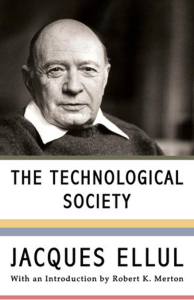Widgetized Section
Go to Admin » Appearance » Widgets » and move Gabfire Widget: Social into that MastheadOverlay zone
Jacques Ellul’s Warnings: Technology, Propaganda and Constitutional Freedom
The views expressed are those of the author and do not necessarily reflect the views of ASPA as an organization.
By Bill Brantley
June 20, 2025

Current initiatives aimed at restructuring the U.S. federal government, such as those outlined in the 2025 Mandate for Leadership and through the Department of Government Efficiency (DOGE), go beyond administrative changes. They signify a significant shift in governance that Jacques Ellul described as potentially impacting democratic societies.
Jacques Ellul’s (French philosopher, sociologist, lay theologian and professor) books—The Technological Society (1954), Propaganda (1962) and The Political Illusion (1965) – help public administration scholars understand how technocratic rationality, systemic propaganda and reduced participatory politics threaten American constitutional freedoms.
The Technological Mindset and the Subversion of Democratic Bureaucracy
Ellul’s The Technological Society presents “technique” as an autonomous force in modern life, indifferent to moral, cultural or democratic concerns. When efficiency becomes the main goal of political institutions, human agency, nuance and constitutional safeguards are sidelined.
DOGE proposes overhauling the federal workforce by removing civil service protections, replacing career officials with loyalists and using AI and performance metrics to automate decision-making. These changes, described as modernization and efficiency, align with Ellul’s concept of the “technical phenomenon,” where technique replaces judgment and policy becomes an engineering issue.
The U.S. civil service was designed to represent constitutional values such as neutrality, continuity and accountability. It functions as an institutional safeguard. However, under DOGE’s vision, these principles are viewed as challenges to executive control and private-sector imitation. The role of a public servant is seen as that of a replaceable technician and the administrative state is considered a machine.
Propaganda and the Creation of Administrative Consent
In Propaganda, Ellul states that propaganda in a technological society is used not only by autocratic regimes but also by democratic societies that rely on mass consent.
Propaganda influences by flooding the environment with messages that suppress critical thinking, heighten emotions and promote reliance on centralized authorities. DOGE’s bureaucratic transformation includes a shift in narrative, portraying the federal workforce as a “deep state,” seen as incompetent or disloyal to public interest.
Government expertise is criticized as elitist and administrative processes are seen as obstructive. Meanwhile, slogans about returning power to “the people” dominate political speeches, media and campaigns.
This exemplifies Ellul’s concept of propaganda: it does not aim to persuade through evidence but rather to shape the social conditions in which individuals no longer question their governing structures. As Ellul elucidates, propaganda must correspond with a society’s technical environment. In our current digitally mediated, algorithm-driven culture, the propaganda surrounding government reform evolves into a viral, self-reinforcing belief system.
The Political Illusion and the Displacement of Civic Power
Ellul’s The Political Illusion argues that democratic rituals create an illusion of citizen influence, while real decisions are made by technocratic and corporate entities beyond public reach.
The restructuring of the federal government claims to empower citizens, but it actually centralizes power in the executive, avoids Congressional oversight and reduces the judiciary’s ability to review actions, reflecting power consolidation rather than participatory governance.
Additionally, the emphasis on performance dashboards, privatization and outsourcing leads to a governance structure that lacks transparency for the public. Ellul cautioned that as technical and economic systems supersede political decision-making, the facade of democracy persists while its true essence is diminished.
Public administration becomes administration without the public.
Constitutional Consequences
The U.S. Constitution ensures protections like separation of powers, due process, freedom of speech and the administrative state to prevent tyranny. The civil service system institutionalized these protections in the executive branch during the 20th century.
However, DOGE’s proposed reforms politicize the civil service, replace rules-based governance with personal loyalty and weaken neutral administration.
Freedom of speech suffers when federal employees fear reprisal for dissent. Equal protection weakens with ideologically driven hiring and firing practices. Due process fails when agencies prioritize executive directives over statutory mandates.
These results stem from a political movement influenced by Ellul’s three forces: the drive for technical efficiency, the prevalence of manipulative narratives and the perception of participatory democracy.
Implications for Researchers in Public Administration
Ellul’s framework offers a way to understand the changing nature of governance in the 21st century. For public administration scholars, his work highlights the importance of distinguishing between efficiency and legitimacy while supporting the civil service as a democratic institution.
We need to revive ethics, constitutionalism and organizational culture in public administration programs. It’s essential to challenge technocratic reforms that overlook the human and deliberative aspects of governance. We should promote real public engagement through participation, dialogue and shared responsibility.
The DOGE reforms illustrate Ellul’s warnings, potentially neutralizing the Constitution in practice without dismantling it. Ellul cautioned that freedom loss in modern societies often arises from internalized technical rationality, propaganda pacification and political spectacle seduction rather than overt oppression.
It is the task of today’s public administrators to ensure that we do not trade our democratic inheritance for the illusion of efficiency.
Author: Dr. Bill Brantley is the President and Chief Learning Officer for BAS2A, an instructional design consultancy for state and local governments. He also teaches at the University of Louisville, the University of Maryland and Franklin University. His opinions are his own and do not reflect those of his employers. You can reach him at https://www.linkedin.com/in/billbrantley/.


Follow Us!